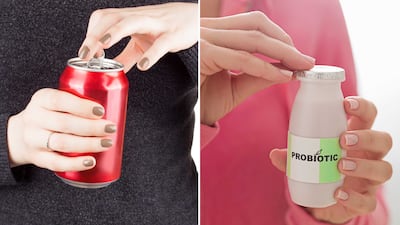The number of people with Type 2 diabetes will rise from 529 million in 2021 to more than 1.3 billion in 2050, according to two recent scientific papers.
Findings published in The Lancet and The Lancet Diabetes & Endocrinology journals on Thursday revealed the soaring figures.
The increase, researchers claim, stems from a rise in obesity and health inequalities.
"These numbers are alarming as this will not just be physically and emotionally draining, but financially as well," says Melanie Dsouza, a clinical dietitian at Aster Hospital Sharjah. "For our current generation, all types of food are just a click away, but we fail to realise the damage it is doing to our body.
"While Type 2 diabetes can be managed with a well-balanced lifestyle, choosing to make the changes early on can help prevent it altogether," she adds.
Small changes, big impact
Dsouza offers four healthy swaps that can lead to a better lifestyle.
1. Choose drinks such as probiotics or homemade lemonades rather than sugary drinks from a can. This not only means fewer calories, but also helps improve gut health, which is important for better weight management and reducing or preventing insulin resistance.
2. Choose brown pizza over white pizza using a whole-wheat base topped with more vegetables and protein sources such as lean meat or tofu, and minimal cheese.
3. Instead of adding heavy mayonnaise or excessive amounts of cheese to salads, opt for a lighter dressing such as lemon and chilli, or lime, olive and balsamic vinegar.
4. Make a vegetable omelette rather than a plain one, by adding chopped peppers, broccoli and spinach to get extra fibre and antioxidants that are good for gut health and support immunity.
Ruba Elhourani, senior clinical dietician and head of the nutrition department at RAK Hospital in Ras Al Khaimah, adds: "Make the switch to non-starchy vegetables such as cucumber, mushrooms and lettuce, as these do not have high carbohydrate content, rather they are higher in water content. This will fill you up without affecting your blood sugar."
Better choices for better health

Meanwhile, clinical dietitian Mitun de Sarkar, founder of Simply Healthy, a meal plan company in Dubai, offers the following replacements for breakfast, snack and main course options.
Breakfast
- Pick eggs instead of sugary cereals.
- Put cinnamon instead of honey over your porridge.
- If you can avoid fruits, replace them with nuts and seeds. Or have chia seeds or flaxseeds instead of plain fruit. Among fruits, go for berries over bananas and apples over mangoes. Greek yoghurt is also better instead of fruit yoghurt.
- Opt for steel-cut oats instead of instant oats.
Snacks
- Munch on figs and prunes instead of cookies.
- Creamy and starchy soups can be replaced with a salad or stir-fried crunchy vegetables.
- Vegetable sticks also go well with dip and can replace unhealthy tortilla chips. When it comes to dips, go for guacamole over a cheesy option.
Main meals
- Lean chicken breast instead of processed sausages, lunch meats and bacon.
- Brown rice instead of white rice.
- Mashed beans and lentils instead of mashed potatoes.
- Cottage cheese instead of processed sliced cheese.
- Millet flour instead of refined white flour.
- Quinoa instead of couscous.
Dsouza echoes De Sarkar's carbohydrate replacements, adding: "Carbohydrates are a major part of our daily meals. While it is beneficial to consume them, focusing on portion control and choice of carbs – brown rice, whole wheat pasta, millets etc – can help prevent diabetes effectively."
"Mindful eating is another tactic," she says. "While choosing the right kinds of food is a major part of adopting a better lifestyle, pausing and cherishing the food we eat is another way to have better control on portion sizes."
She adds walking or being active after a meal "helps the body to utilise glucose effectively", which in turn helps control insulin sensitivity and aids in digestion. "This small change in our routine could benefit us in the long run."
Elhourani says exercise in general "stabilises blood sugar, so increase physical activity simply by using the stairs instead of the lift or parking your car farther away".










